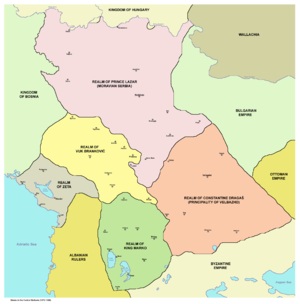Fall of the Serbian Empire
Between 1365 and 1371, King Vukašin was the co-ruler of Emperor Uroš, ruling the southern half, thus the Empire may be viewed as a de facto diarchy.
The lords could not agree on the rightful ruler; they dismissed Prince Marko, the son of Vukašin, and conflicts started between the nobles within a year.
The period after the death of Uroš and Vukašin (1371–89) was marked by the rise and fall of Prince Lazar, and the power struggle of the minor provinces.
The rule of Lazar ended with his death in the Battle of Kosovo in 1389, when Serbia stood up against invading Ottomans, an event that is deeply rooted in Serbdom.
Meanwhile, in the Serbian, Bulgarian and Byzantine borderlands of western Thrace, Matthew Kantakouzenos, the son of the Byzantine emperor John VI Kantakouzenos made war on the Serbs in 1356-57 but failed to capture Serres with his five-thousand Turks and was soon defeated in battle by Vojvoda Vojin and held for ransom.
The most powerful noble was Vojislav Vojinović who quarrelled with the Republic of Ragusa in the fall of 1358, when the Serbs and the Hungarians clashed along the Danube.
In 1365 Vukašin was proclaimed King of Serbia and co-ruler with Uroš, and Jovan Uglješa was made Despot in the Serbian principality of Serres.
There was a far more serious problem for Serbia — and the whole Balkans — than the internal squabbling of the Serbian nobles, and that was the advance of the Ottoman Turks in Europe.
King Vukašin and his son Marko were in Scutari preparing for action against Nicholas Altomanovich when they were summoned east to join up with Uglješa and his army and then together they easily penetrated what was supposedly Turkish territory and reached Cernomen on the Maritsa River, where the Serbs did not bother to post sentries or have scouts as did the Turks.
Stefan Uroš V died childless on December 2/4 1371, after much of the Serbian nobility had been destroyed by the Turks in the Battle of Maritsa earlier that year.
Vukašin's son Marko inherited his father's royal title and thus became the disputed successor of the Serbian throne, the nobles pursued their interests, quarrelling with each other.
Serbia proper became a vassal of the Ottomans in 1390 but remained effectively ruled by the Lazarevićs and then by their Brankovićs successors until the fall of Smederevo in 1459.
The edict confirmed the laws of Emperor Stefan Uroš from the Serbian Nemanjić and gave privileges to Ragusian traders, including imposed taxes on the Adriatic City.
Soon afterwards came the end of the Nemanjić dynasty, when Uroš died on 2 or 4 December 1371, which formally made Marko the sovereign of the Serbian state.
He was one of the Serbian nobles from Zachlumia and Travunia (adjacent principalities in present-day Herzegovina) who had received lands in the newly conquered parts of Macedonia during Tsar Dušan's reign.
In July of that year, Vukašin and Marko camped with their army outside Scutari, on Balšić's territory, ready to make an incursion towards Onogošt in Altomanović's land.
The attack never happened, as the Ottomans threatened the land of Despot Jovan Uglješa, the lord of Serres, Vukašin's younger brother who ruled in eastern Macedonia.
At the Battle of Maritsa on 26 September 1371, the Turks annihilated the Serbian army; not even the bodies of Vukašin and Jovan Uglješa were ever found.
The place where it was fought, near the village of Ormenio in the east of present-day Greece, has ever since been called Sırp Sındığı "Serbian Rout" in Turkish.
Most historians agree that in concluding negotiations, Đurađ gained the towns of Trebinje, Konavle and Dračevica from Altomanović, possibly a bribe to remain neutral within the war.
In his signatures, he titled himself as the "Autocrat of all the Serbs" (самодрьжць вьсѣмь Србьлѥмь); nevertheless, he was not powerful enough to unite all Serbian lands under his authority.
The families of Balšić and Mrnjavčević, Konstantin Dragaš (maternally a Nemanjić), Vuk Branković, Tvrtko and Radoslav Hlapen, ruled in their respective domains without consulting with Lazar.
Bayezid, with his reserves fresh and ready for battle, counterattacked Lazar's Serbs, who had been pushing hard against the Ottoman centre.
While the Serbs then retreated, the Ottoman army also withdrew, due to their heavy casualties, and Bayezid returned to Adrianople to consolidate his hold on his new throne.




